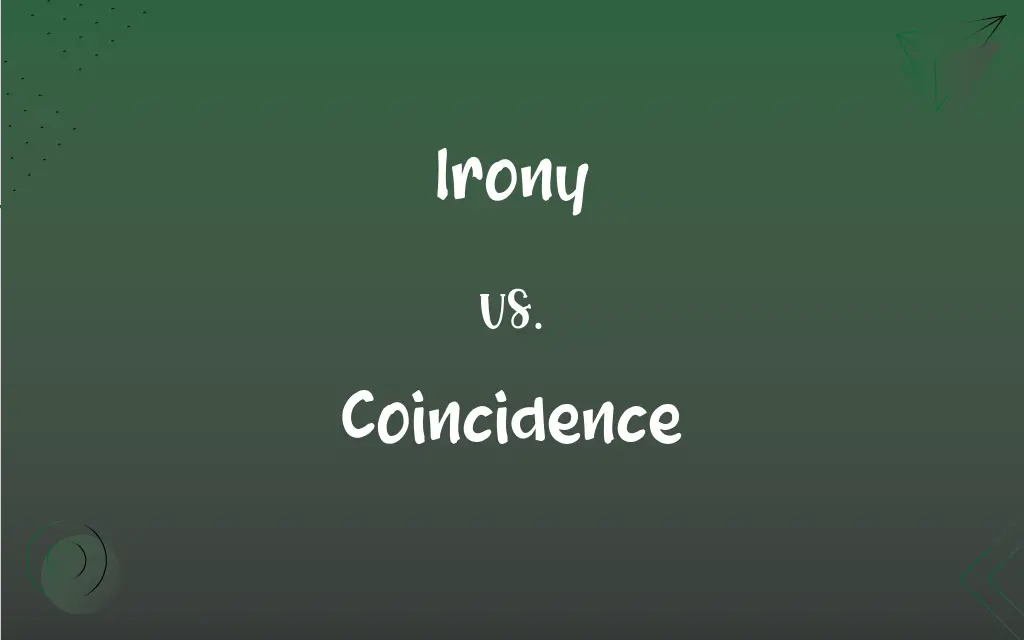Irony vs. Coincidence: What's the Difference?
Edited by Aimie Carlson || By Janet White || Published on November 29, 2023
Irony involves a contrast between expectation and reality, while coincidence is an unexpected occurrence of two or more events at one time with no apparent causal connection.

Key Differences
Irony is a literary device where the intended meaning is opposite to the literal meaning, often highlighting a discrepancy between expectations and reality. Coincidence, on the other hand, refers to the occurrence of two or more events at the same time, appearing related but having no causal connection.
Irony is often used in literature and speech to convey sarcasm or humor, creating a twist that defies normal expectations. In contrast, coincidence does not involve intention or planning; it's simply a matter of events happening simultaneously by chance.
Irony can be situational, verbal, or dramatic, each type serving to create a contrast between what is expected and what actually occurs. Coincidence, however, is purely a matter of chance, often surprising those involved by the unexpected alignment of events.
In irony, the awareness of the audience or reader is crucial; they must recognize the irony for it to be effective. Coincidence does not require awareness or understanding, as it is not a constructed narrative element but rather a spontaneous occurrence.
Irony often carries a deeper meaning or critique, used by authors and speakers to make a point or highlight an issue. Coincidence, while it can be striking or thought-provoking, does not inherently carry a deeper message or critique.
ADVERTISEMENT
Comparison Chart
Definition
A literary device indicating a discrepancy between expectation and reality.
Two or more events occurring simultaneously by chance.
Intentionality
Often intentional, used for effect.
Unintentional, a matter of chance.
Audience Awareness
Requires recognition for effect.
Does not require awareness.
Usage in Literature
Conveys deeper meaning or critique.
Often just a plot element.
Nature
Contrived and planned.
Spontaneous and unplanned.
ADVERTISEMENT
Irony and Coincidence Definitions
Irony
A situation where the outcome is contrary to what was expected.
A fire station burns down.
Coincidence
Two or more similar or related events occurring at the same time by chance.
Two friends calling each other at the same moment.
Irony
Dramatic irony occurs when the audience knows something the characters do not.
In a movie, the audience knows the killer is in the house but the character does not.
Coincidence
A surprising alignment of events without a deliberate plan.
Wearing the same outfit as a stranger at an event.
Irony
Verbal irony involves saying one thing but meaning the opposite.
Saying What a pleasant day! during a storm.
Coincidence
A sequence of events that although accidental seems to have been planned.
Winning a contest on your birthday.
Irony
Socratic irony involves feigning ignorance to expose another's ignorance.
Asking seemingly simple questions to reveal flaws in the other's logic.
Coincidence
An unplanned and fortunate discovery occurring while looking for something else.
Finding a lost ring while searching for keys.
Irony
Situational irony involves actions having an effect opposite to what was intended.
A pilot afraid of heights.
Coincidence
A remarkable concurrence of events without apparent causal connection.
Meeting a friend in a foreign country unexpectedly.
Irony
The use of words to express something different from and often opposite to their literal meaning.
Coincidence
The state or fact of occupying the same relative position or area in space.
Irony
An expression or utterance marked by a deliberate contrast between apparent and intended meaning
"the embodiment of the waspish don, from his Oxbridge tweeds to the bone-dry ironies of his speech and prose" (Ron Rosenbaum).
Coincidence
A sequence of events that although accidental seems to have been planned or arranged.
Irony
Incongruity between what might be expected and what actually occurs
"Hyde noted the irony of Ireland's copying the nation she most hated" (Richard Kain).
Coincidence
Of objects, the property of being coincident; occurring at the same time or place.
FAQs
What is irony?
Irony is a rhetorical device or literary technique where the actual meaning differs from the literal meaning, often with a contrasting or unexpected outcome.
What is coincidence?
Coincidence is the occurrence of two or more events at the same time by chance, without any apparent causal link.
Can coincidence be meaningful?
While coincidence is random, people often attribute personal or significant meaning to it.
Can coincidences be predicted?
No, coincidences are random and cannot be predicted.
Can irony be intentional?
Yes, irony, especially in literature or speech, is often used intentionally for effect.
What is an example of situational irony?
An example is a lifeguard who is afraid of water.
Is irony always humorous?
No, irony can be used for dramatic, critical, or satirical purposes, not just humor.
What is the difference between irony and sarcasm?
Irony is a broad literary device, while sarcasm is a form of verbal irony that is often biting or mocking.
Do coincidences have any scientific explanation?
Coincidences are usually explained as random occurrences, though patterns can sometimes be observed.
Is coincidence always accidental?
Yes, coincidence is by nature accidental and not planned.
How does dramatic irony function in literature?
In dramatic irony, the audience knows something the characters do not, creating tension or humor.
What is an example of cosmic irony?
Cosmic irony involves fate or destiny playing a role in creating an ironic situation, like a lottery winner losing the ticket.
Are coincidences always surprising?
Often, but not always. Some coincidences may go unnoticed or seem mundane.
What makes verbal irony effective?
Verbal irony relies on tone and context to convey a meaning opposite to the words spoken.
How is irony used in satire?
In satire, irony is used to critique or mock societal norms or behaviors.
How does coincidence differ from fate?
Coincidence is random and unplanned, while fate implies a predetermined outcome.
Can irony be misunderstood?
Yes, if the audience misses the context or tone, irony can be misinterpreted.
Can coincidences be statistically analyzed?
Yes, statisticians and scientists sometimes analyze coincidences to understand their probability.
What is the role of coincidence in storytelling?
In storytelling, coincidences can be plot devices that drive the narrative forward.
Is there a psychological aspect to interpreting coincidences?
Yes, people often interpret coincidences based on personal biases or beliefs, seeking patterns or meaning.
About Author
Written by
Janet WhiteJanet White has been an esteemed writer and blogger for Difference Wiki. Holding a Master's degree in Science and Medical Journalism from the prestigious Boston University, she has consistently demonstrated her expertise and passion for her field. When she's not immersed in her work, Janet relishes her time exercising, delving into a good book, and cherishing moments with friends and family.
Edited by
Aimie CarlsonAimie Carlson, holding a master's degree in English literature, is a fervent English language enthusiast. She lends her writing talents to Difference Wiki, a prominent website that specializes in comparisons, offering readers insightful analyses that both captivate and inform.































































